It’s Not About Depression…
The main mistake most films or books make is to put depression at the center of the plot and has everything revolve around it when it’s really not the case.
Prozac Nation heralds psychiatric therapy and sustained medication use as a way to reconnect Elizabeth with her “real” self for lengthy periods of time.
The Hours depicts depression as a silent killer and focuses on how it affects everyone close to a person suffering from what is defined as an illness.
Revolutionary Road is a social commentary on social roles implying that being a suburban housewife is responsible for April’s depression.
…But It Is About Depression
Depression is just the default state of being; it does affect every part of life but it isn’t affected by anything.
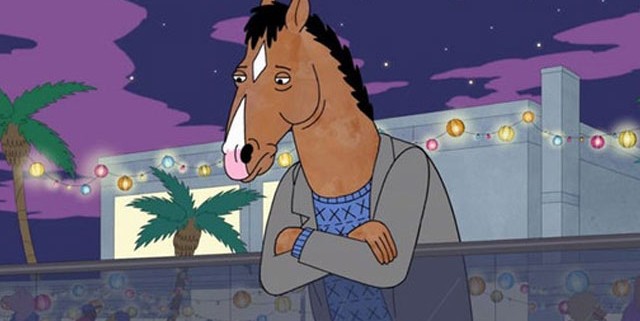
BoJack has everything a horse can dream about, yet he’s still wallowing all alone, wondering why he isn’t as happy as he should be.
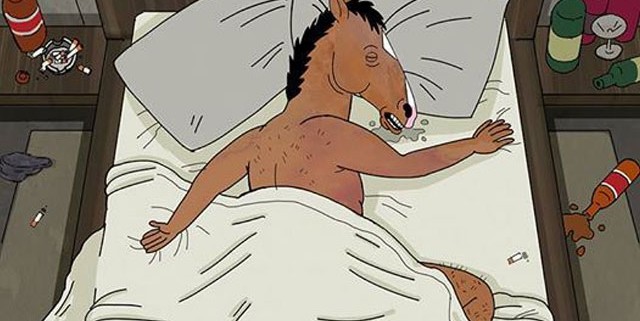
Procrastinating and sleeping to make the time go faster is a telltale sign of depression; with life being meaningless between two awaited and scheduled events.
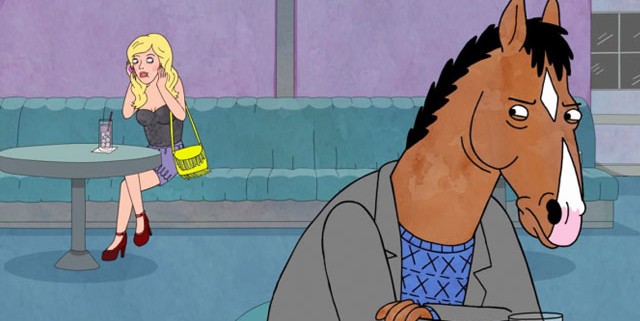
Loneliness becomes the only companion one can bear, strangers, as nice and welcoming as they may be, are an annoyance as they break the solitude.
Happiness Is Insufferable
It’s difficult to stand people who are always happy or who can find a way to be positive about any situation. It’s more than jealousy; the happier they are, the more we are reminded that we will never be.
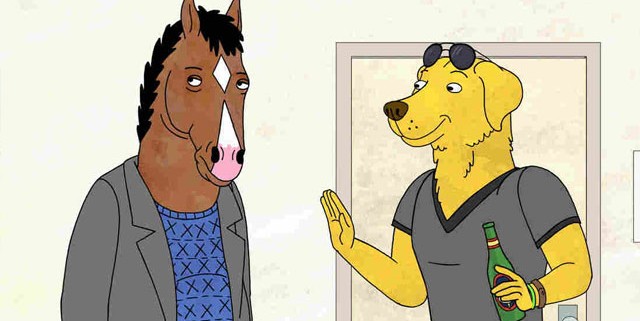
Mr. Peanutbutter is what BoJack should be: he also had a successful tv show in the 90s but unlike BoJack he’s always happy with what’s happening in his life.
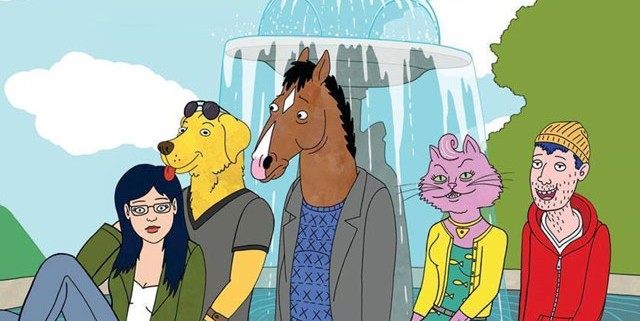
He is a living reminder that if BoJack was a happy person, maybe Diane would be getting married to him, that what he cannot have is what would make him happy.
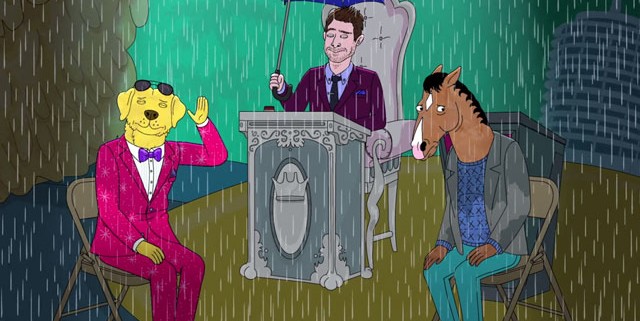
BoJack is so foreign to happiness that he mistakes Mr. Peanutbutter jovial attitude for a complete lack of awareness and a display of naiveté.
Mr. Peanutbutter: “All I ever wanted was to be your friend and you treat me like a big joke. Do you think I don’t notice? Why don’t you like me? Tell me!”
BoJack: “Because… I’m jealous… of everything. Everything comes so easy for you.”
Mr. Peanutbutter: “And it doesn’t for you? You’re a Millionaire movie star, with a girlfriend who loves you, acting in your dream movie; what more do you want? What else can the Universe possibly owe you?”
BoJack: “I want to feel good about myself, the way you do, and I don’t know how. I don’t know if I can.”
A Warped Vision of the World
The same way optimists and pessimists see the same world in a completely different manner; people suffering from depression see it in a more flawed, cynical way, than most do. There is no anger or bitterness in their viewpoint; just an expectation for disappointment.
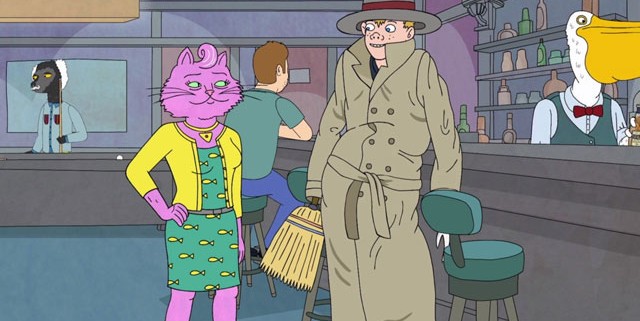
BoJack is the only one who sees Princess Carolyn’s boyfriend, Vincent, as three kids stacked up on top of each other; everyone else treats him as a peer.
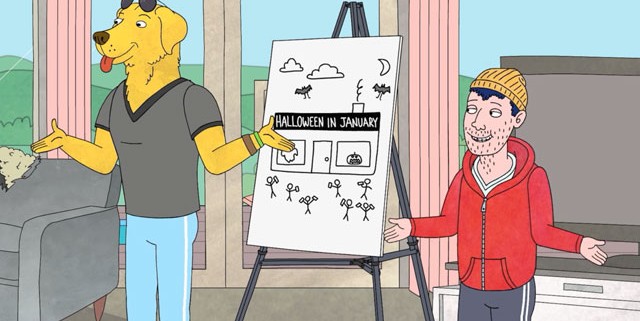
When most people would be supportive of Mr. Peanutbutter and Todd business ideas, BoJack has to point out how ridiculous opening a Halloween store in January is.
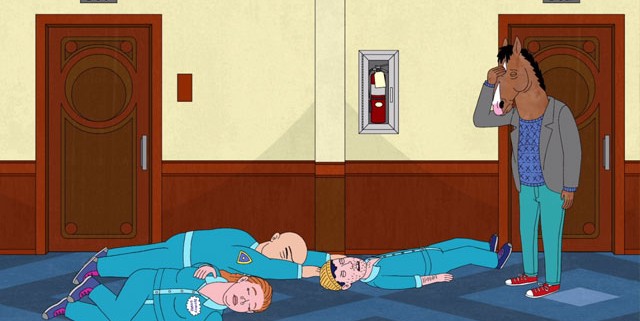
Surrounded by people way too much into improv’, BoJack has to be the one not joining the mass hysteria but instead being very cynical about the insanity of it all.
Alone with Everybody
People know about acute depression, bi-polar and seasonal affective disorders; chronic depression is a different animal and its sinusoidal pattern gradual nature often damages relationships as it is perceived as a person revealing their true nature as opposed to a symptom indicating a change of mood. It is not helped by the innate desire to blend in by depressed people who often try to portray themselves at their best as much as possible which can lead to outbursts when the mask falls.
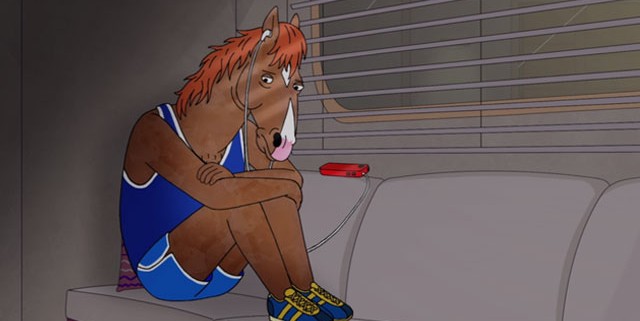
Even in a very busy environment, like a film set, BoJack has to step away as pretending to be someone else for an extended period of time is mentally exhausting.
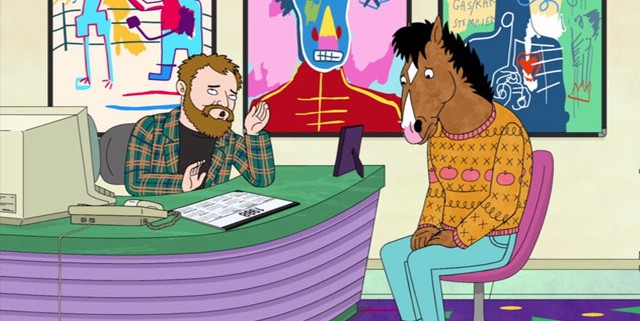
That mental exhaustion is the reason, despite being surrounded by supportive people, BoJack is in constant need of reassurance from the individuals he trusts.
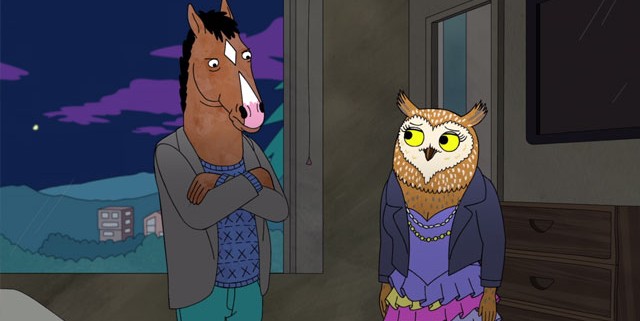
As always with chronic depression, it’s hard to wear the mask of normality 24/7, sooner or later the ones who spend enough time around, get to see what’s behind it.
Wanda: “I don’t know where this is all coming from. Every good thing that ever happened to you, happened because of network executives like me. That show you spend all day watching, your house, your career.”
BoJack: “Great house, great career, great life; that must be why I’m so god damn happy all the time! You don’t even know.”
Wanda: “Oh, I don’t know?”
BoJack: “My life was ruined by a network executive like you.”
Wanda: “Well, I’m sorry that things have been so hard for you, but that doesn’t give you the right to be shitty to me. I can’t be around someone who’s just fueled by bitterness and negativity.”
BoJack: “Well then, what are you doing here?”
Wanda: “What happened BoJack?”
BoJack: “Same thing that always happens; you didn’t know me; then you fell in love with me, and now you know me.”
Trying to Numb the Pain
Self-destructive behavior is often the easiest way to numb the pain and forget about not being happy; it can a chemical dependence to endorphins which can often lead to addiction; not talking about drugs but anything that can initiate the release of this hormone.
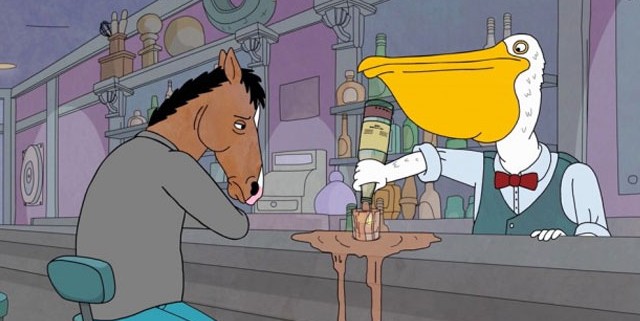
Despite being often drunk, BoJack isn’t an alcoholic; he can stop drinking whenever he wants; he shows it several times, but it’s always about finding a better replacement for his lack of happiness.
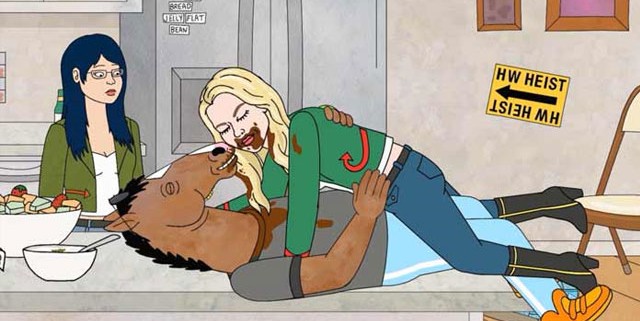
The original meaning of the word sadgasm defines exactly how BoJack’s meaningless sexual consumption is just part of how he treats his depression; it won’t make him happy; it will hide the pain for a while.
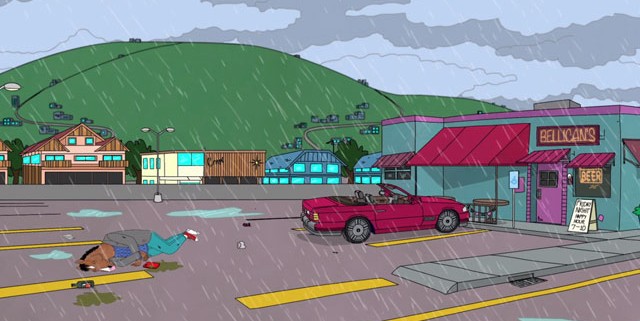
This is why the sadder BoJack is, the more extreme his antics get; to some extent, he tries to find ways to go to the point of no return; hoping for an easy way out of life.
Surrounding Oneself With Even More Messed Up People
One way to feel normal is to surround oneself with people more messed up than you are; it makes you feel more normal. Selfish behavior or survival mechanism?
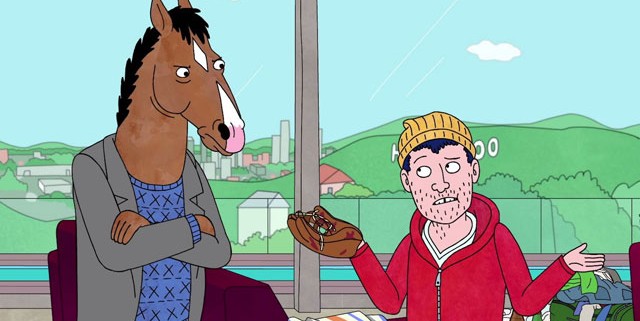
BoJack’s relationship with Todd Chavez is the perfect example of that: as much as BoJack disparages the unfortunate Todd, he needs him in his life to feel better about himself.
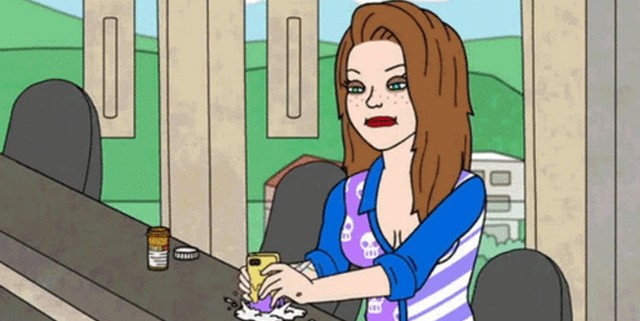
Sabrina, the drug-addicted BoJack’s costar in Horsin’ Around represents a lot of things for our horse; she’s a link to his past and the living proof that someone with a similar life than his can fall hard in life.
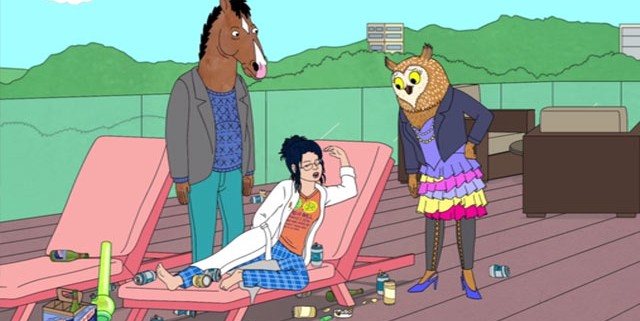
In many ways, BoJack facilitates Dianne’s downfall; despite caring for her; her being messed up changes their dynamic and he can serve as the one caring for her, instead of the one being cared for.
Running Away From The Present…
The relationship to time tells a lot about the character of someone with chronic depression: at some point, it can become an excuse that people use to justify some poor decisions taken in the past; therefore, the present often constitutes that moment when the excuse is invalidated; especially by the people who really know the person.
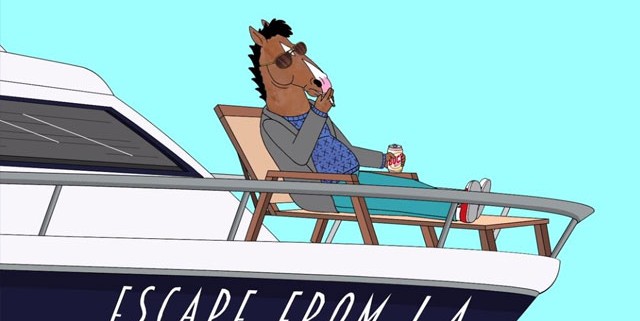
BoJack’s bought Escape From LA, has many meanings, one of them is being trapped in a life he only knows he is not happy with, and needs to run away from.
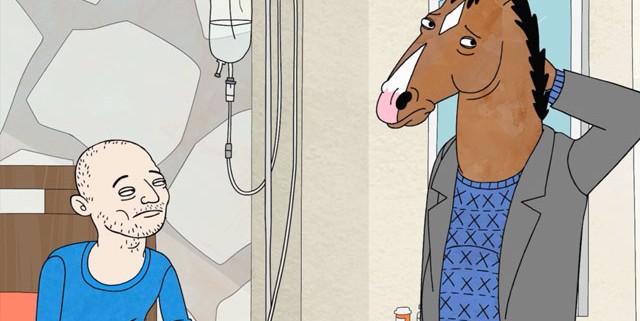
Herb Kazzaz was betrayed by BoJack in the 90s; he is a reminder of poor decisions BoJack has taken in the past and been justifying to himself by putting his non-existing happiness ahead of the friend who made him a household name.
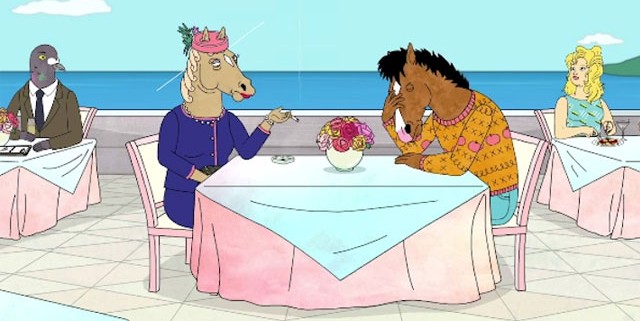
BoJack cannot stand to spend time with his mother, Bea Horseman; she’s one of the few people he cannot lie to and cannot hide from; she knows him enough to call him out on using his depression as an excuse.
Bea Horseman: “I’ve read your book… I’ve read the parts about me; the things I’ve said to you. You must think I’m a real monster. I don’t want to fight you BoJack. I just wanted to tell you I know. I know you want to be happy but you won’t be and I’m sorry.”
BoJack: “What?”
Bea Horseman: “It’s not just you; you know. Your father and I, we… well… You come by it honestly the ugliness inside you. You were born broken; that’s your birthright, and now you can fill your life with projects, your books and your movies, and your little girlfriends but that won’t make you whole. You’re BoJack Horseman and there’s no cure for that.”
…While Being Obsessed with Nostalgia…
As the present represent unhappiness, it’s easy to fall into the delusion that the past was better; that the past happy; it’s again a skewed version of the world that gives hope that happiness existed or that it could exist if the past was different.
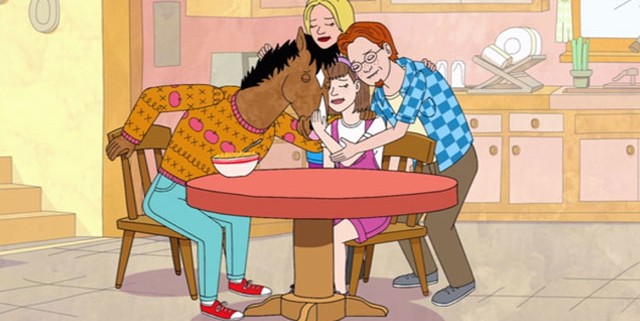
BoJack is often nostalgic of the sitcom Horsin’ Around he was the star of; to the point of often trying to equate the on-screen tv show for a past reality which never happened.
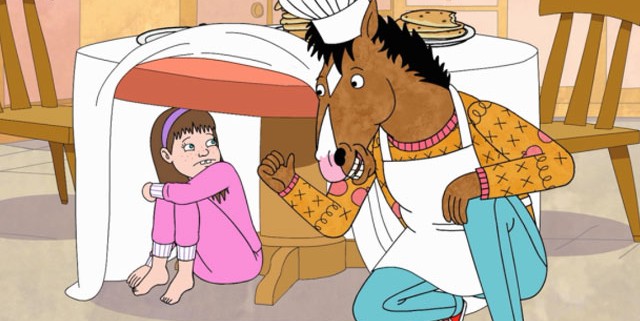
BoJack’s relationship with Sabrina is completely muddled by him trying to see himself as a father figure for her and pondering if saving her will save himself.
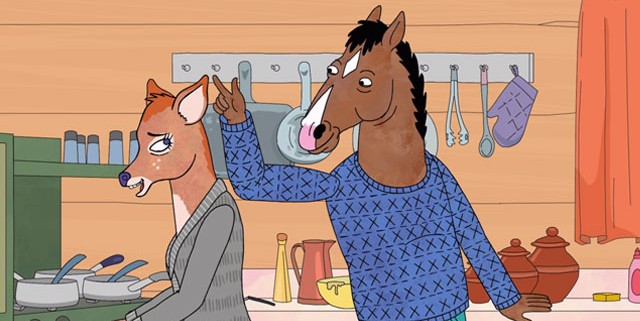
What if? The question BoJack asks himself, because blaming a poor decision is easier that blaming who he is at his core; it also provides the opportunity of a fantasy, a dreamed life, that never was but could have been.
…To The Point Of Trying To Fix a Past that Never Existed
This is why too often, try to mend the past in the present is something that depression makes you think about; but instead of re-conciliating the past with the present; it only exacerbates the feeling of unhappiness and pushes towards making the wrong decisions.
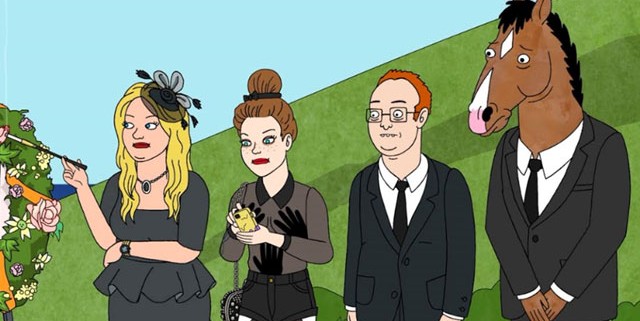
BoJack never was nice or cared for the kids sharing the screen with him in the 90s, yet after Herb’s funeral he tries to become the father figure he played in Horsin’ Around to adults who don’t need or want him as one.
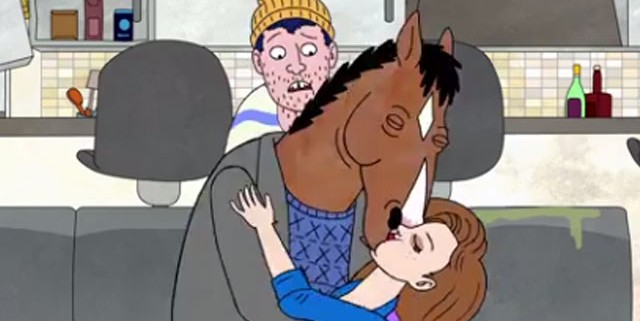
In the bad decision department, BoJack having a fling with Sabrina who he used to play the father in Horsin’ Around is the complete result of two messed up people trying to use the other for their own salvation.
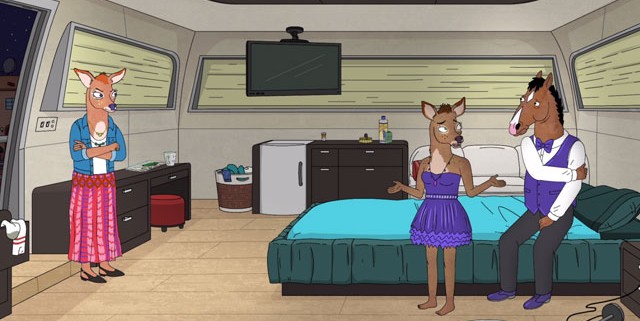
The culmination of trying to replicate the past while taking a different decision comes crashing down when BoJack tries to have a relationship with Penny Carson, the daughter of Charlotte Moore, the one who got away.
Acknowledging Being Broken Inside
The most difficult part of being depressed is accepting that you are; that it won’t go away because the longer you deny it; the longer you fight it; the longer you end up lying to yourself, trying to convince yourself that you are like everyone else but deep down you know there’s something wrong with you; it’s not about combating it; it’s about accepting it.
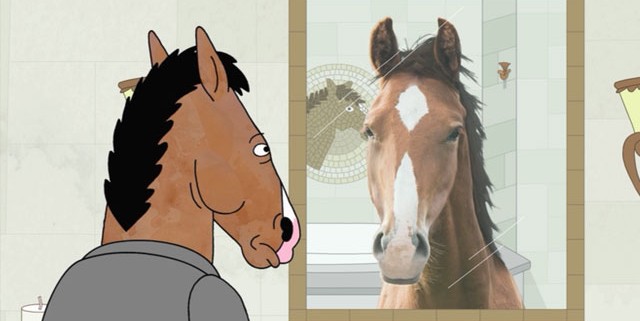
Every time BoJack looks at himself in a mirror, he is reminded that the reflection in front of him will never be the one of the horses he wishes he was.
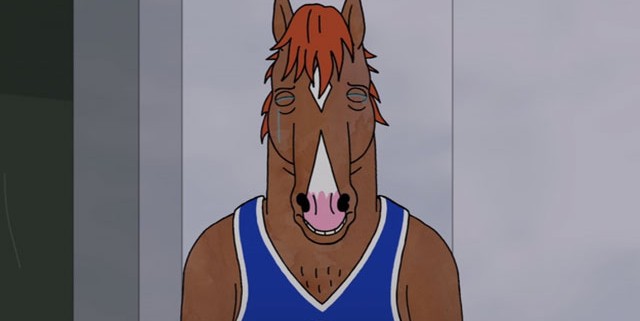
All alone, BoJack cries when he realizes that his inability to shed a tear in public, is just another symptom of how broken he is, and how he’ll never emotionally relate to others.
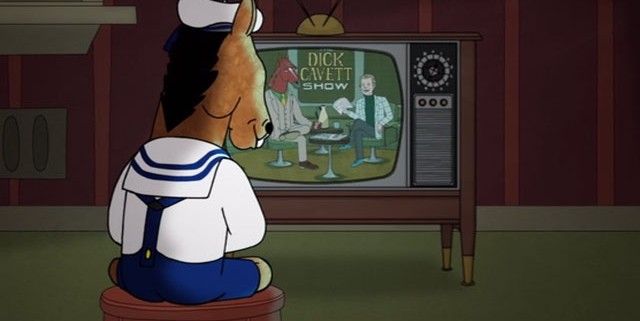
BoJack’s childhood hero, Secratariat, a fallen racing champion, committed suicide a month after answering a letter from his young fan during a TV show.
Dick Cavett: “This letter is from BoJack H., BoJack is 9 years old, BoJack writes: Dear Secretariat, I’m a horse, just like you, I like to watch racing and you are my favorite racer.”
Secretariat: “Smart kid!”
Dick Cavett: “He goes on… my question for you is: I am a good kid, and I like to play, and I like to go to school, but sometimes I get sad; what do you do when you get sad? How do you not be sad? Sincerely, BoJack.”
Secretariat: “That’s a great letter BoJack. When I was your age, I got sad, a lot… I didn’t come from such a great home but one day I started running and that seems to make sense so I just kept running. BoJack when you get sad you run, straight ahead, and you keep running forward, no matter what. They are people in your life who are going to try to hold you back, slow you down, but you don’t let them. Don’t you stop running and don’t you ever look behind you; there’s nothing for you behind you; all that exists, is what’s ahead.”
Being Happy… For A Moment
People suffering from depression can be happy but the state of happiness is only a temporary one and is something that the more aware of their condition they are, the less and less time it lasts.
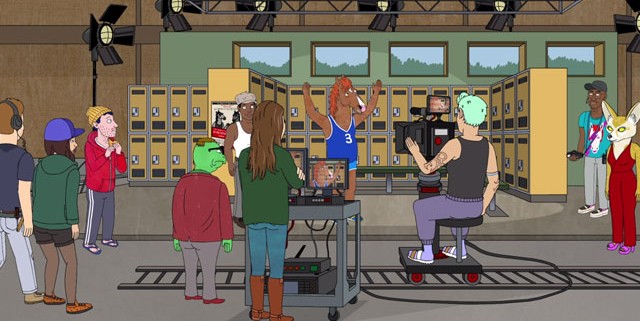
Portraying Secretariat, was the role BoJack always wanted to play; after a few weeks of filming, his self-doubt turned it into a miserable experience.
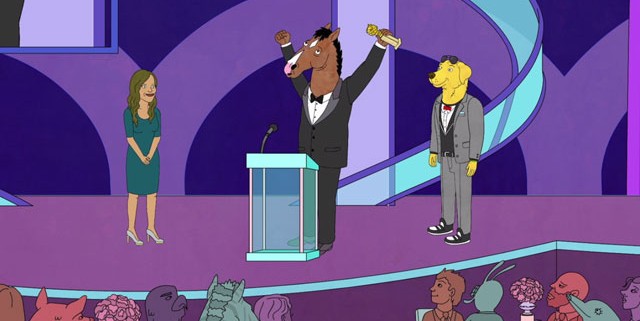
Even during an award ceremony, BoJack’s speech, after winning, goes in a very few sentences from memorializing a triumphant moment to questioning its relevance.
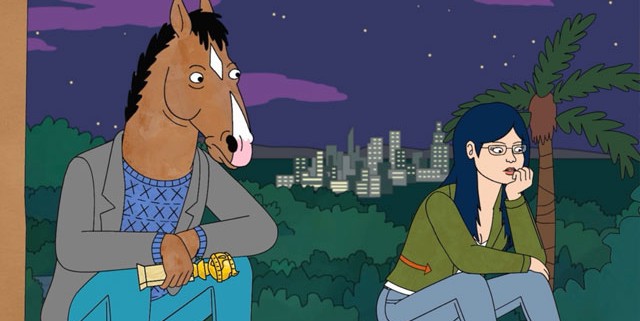
During a party in his honor, BoJack prefers staying hidden outside with Diane reflecting on happiness rather than mingling with people celebrating his accomplishments.
Diane: “Can I ask you something: that play in New York, would that have really made you happy?”
BoJack: “Yeah…I mean… for a little bit.”
Diane: “And if Kelsey didn’t get fired, and you got to make the Secretariat movie you wanted to make, would that have made you happy?”
BoJack: “For a little bit… But then… probably…”
Diane: “So why does it matter?”
BoJack: “But it has to be… more?”
Diane: “Well… When was the last time you were actually happy?”
BoJack shrugs his shoulders.


